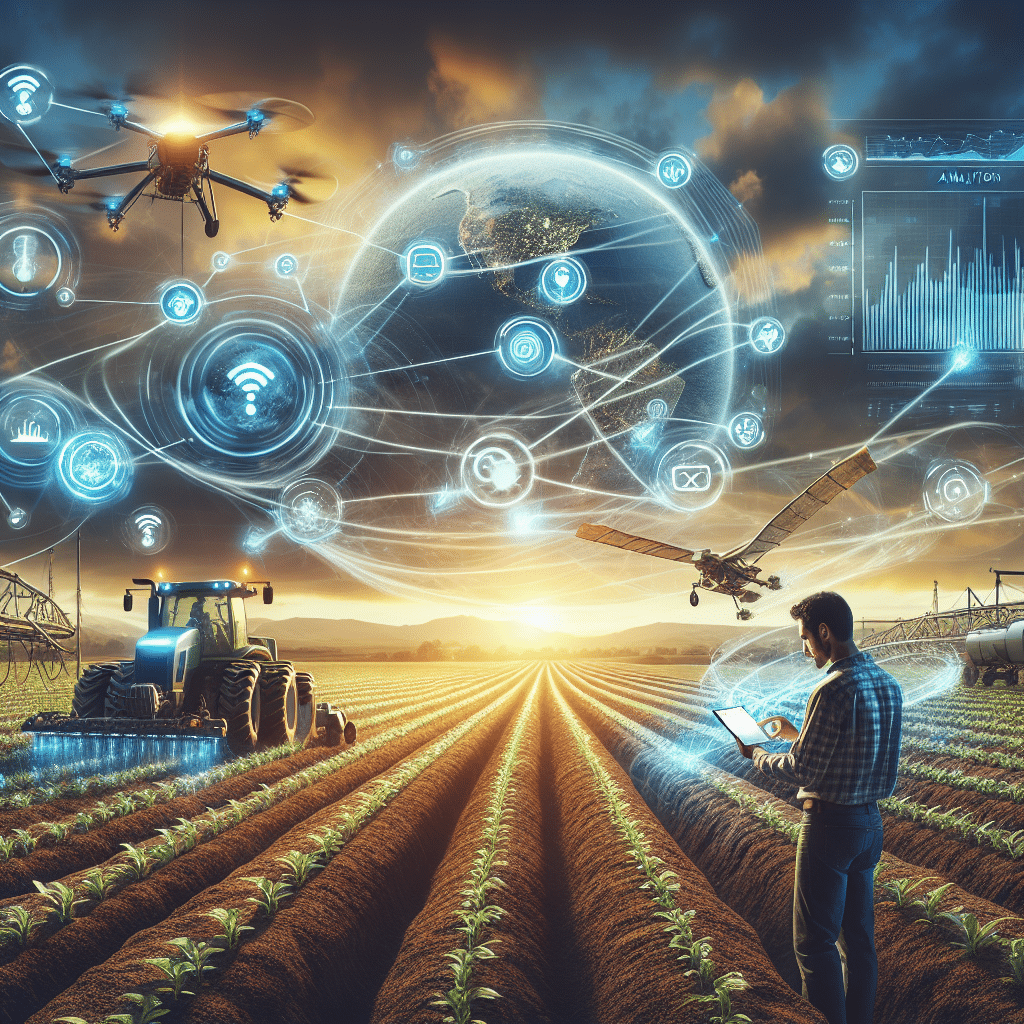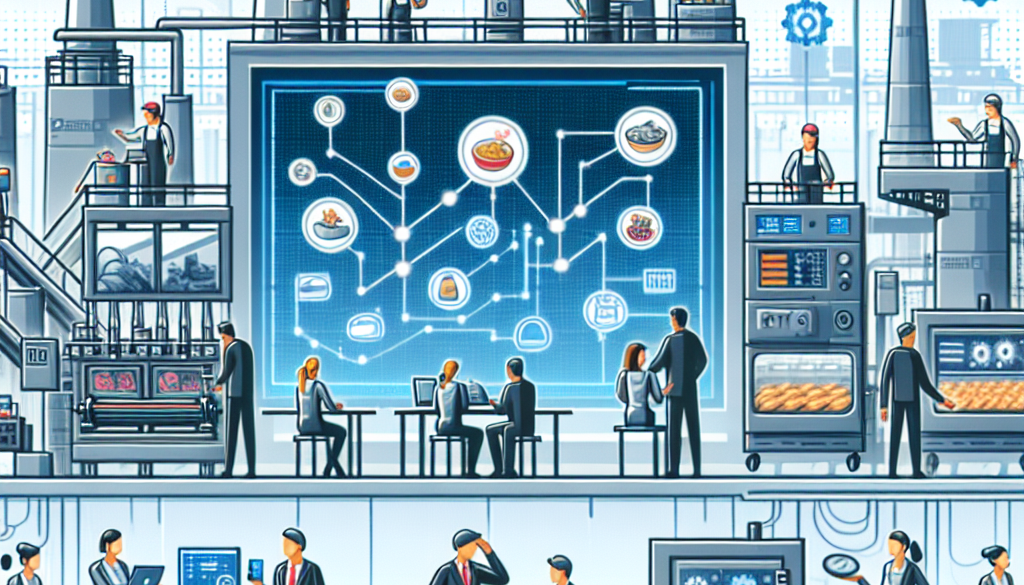Vital Contribution to the Food Industry By IoT and Big Data
-
Table of Contents
- IoT and Big Data: Revolutionizing the Food Industry
- The Impact of IoT in the Food Industry
- Big Data’s Role in Enhancing Food Industry Operations
- Real-World Applications and Success Stories
- Challenges and Considerations
- Conclusion: The Future of Food with IoT and Big Data
- ETprotein: Enhancing Nutrition with High-Quality Protein Products
IoT and Big Data: Revolutionizing the Food Industry

The food industry is undergoing a significant transformation, thanks to the advent of the Internet of Things (IoT) and Big Data analytics. These technological advancements are not just buzzwords; they are making a vital contribution to the way food is produced, processed, distributed, and consumed. In this article, we will explore the various ways in which IoT and Big Data are enhancing the food industry, backed by statistics and real-world applications.
The Impact of IoT in the Food Industry
IoT technology involves the interconnection of physical devices that can collect and exchange data. In the food industry, IoT is making waves in several key areas:
- Supply Chain Monitoring: IoT sensors can track the condition and location of food products throughout the supply chain. This ensures that temperature-sensitive items like dairy and meat are kept at optimal conditions, reducing spoilage and waste.
- Precision Agriculture: IoT devices are used in farming to monitor soil moisture levels, crop health, and weather conditions. This data helps farmers make informed decisions, leading to increased crop yields and sustainable practices.
- Food Safety: IoT sensors can detect pathogens and contaminants in food production facilities. Real-time data allows for immediate action to prevent foodborne illnesses and recalls.
- Energy Management: IoT-enabled devices can optimize energy use in food processing plants and storage facilities, leading to cost savings and reduced environmental impact.
According to a report by MarketsandMarkets, the IoT in agriculture market is expected to grow from USD 12.7 billion in 2019 to USD 20.9 billion by 2024, at a Compound Annual Growth Rate (CAGR) of 10.4% during the forecast period. This growth is indicative of the increasing adoption of IoT solutions in the food industry.
Big Data’s Role in Enhancing Food Industry Operations
Big Data analytics involves examining large and varied data sets to uncover hidden patterns, correlations, and insights. In the food industry, Big Data is being leveraged in several ways:
- Consumer Insights: Big Data helps companies understand consumer preferences and trends, enabling them to tailor products and marketing strategies effectively.
- Operational Efficiency: Analyzing data from various sources helps food companies optimize their operations, reduce costs, and improve productivity.
- Risk Management: Predictive analytics can forecast potential disruptions in the supply chain, allowing companies to mitigate risks before they occur.
- Product Development: Data-driven insights can lead to the innovation of new food products that meet the evolving needs of the market.
A study by Grand View Research suggests that the global big data market size is expected to reach USD 123.2 billion by 2025, expanding at a CAGR of 13.3% over the forecast period. This growth reflects the increasing importance of data analytics in various industries, including food.
Real-World Applications and Success Stories
Many companies in the food industry are already reaping the benefits of IoT and Big Data. For instance:
- A leading global beverage company uses IoT sensors to monitor its vending machines, ensuring timely restocking and maintenance, which has led to increased sales and customer satisfaction.
- A multinational fast-food chain employs Big Data analytics to optimize its menus and drive-thru operations, resulting in shorter wait times and higher revenue.
- An organic farm utilizes IoT technology to monitor crop conditions and automate irrigation systems, leading to a 20% increase in yield while conserving water.
These examples demonstrate the tangible benefits that IoT and Big Data bring to the food industry, from the farm to the consumer’s table.
Challenges and Considerations
While IoT and Big Data offer numerous advantages, there are challenges that need to be addressed:
- Data Security: With the increase in data collection, companies must ensure robust cybersecurity measures to protect sensitive information.
- Integration: Integrating new technologies with existing systems can be complex and requires careful planning and execution.
- Investment: The initial cost of implementing IoT and Big Data solutions can be high, although the long-term benefits often justify the investment.
- Skills Gap: There is a need for skilled professionals who can analyze and interpret Big Data to make informed decisions.
Addressing these challenges is crucial for businesses to fully capitalize on the potential of IoT and Big Data in the food industry.
Conclusion: The Future of Food with IoT and Big Data
The integration of IoT and Big Data in the food industry is not just a trend; it’s a revolution that is enhancing efficiency, safety, and sustainability. As technology continues to evolve, we can expect even more innovative applications that will further transform the industry. The key takeaways from this article highlight the importance of embracing these technologies to stay competitive and meet the growing demands of consumers.
ETprotein: Enhancing Nutrition with High-Quality Protein Products
In line with the technological advancements in the food industry, ETprotein is committed to providing high-quality protein products that cater to the needs of consumers and businesses alike. Their range of organic and non-GMO protein powders, including rice, pea, and seed-based proteins, are ideal for various applications in the food and beverage sector. With a focus on sustainability and purity, ETprotein’s offerings are a testament to the company’s dedication to excellence in nutrition and health.
About ETprotein:
ETprotein, a reputable protein and L-(+)-Ergothioneine (EGT) Chinese factory manufacturer and supplier, is renowned for producing, stocking, exporting, and delivering the highest quality organic bulk vegan proteins and L-(+)-Ergothioneine. They include Organic rice protein, clear rice protein, pea protein, clear pea protein, watermelon seed protein, pumpkin seed protein, sunflower seed protein, mung bean protein, peanut protein, and L-(+)-Ergothioneine EGT Pharmaceutical grade, L-(+)-Ergothioneine EGT food grade, L-(+)-Ergothioneine EGT cosmetic grade, L-(+)-Ergothioneine EGT reference grade and L-(+)-Ergothioneine EGT standard. Their offerings, characterized by a neutral taste, non-GMO, allergen-free attributes, with L-(+)-Ergothioneine purity over 98%, 99%, cater to a diverse range of industries. They serve nutraceutical, pharmaceutical, cosmeceutical, veterinary, as well as food and beverage finished product distributors, traders, and manufacturers across Europe, USA, Canada, Australia, Thailand, Japan, Korea, Brazil, and Chile, among others.
ETprotein specialization includes exporting and delivering tailor-made protein powder and finished nutritional supplements. Their extensive product range covers sectors like Food and Beverage, Sports Nutrition, Weight Management, Dietary Supplements, Health and Wellness Products, and Infant Formula, ensuring comprehensive solutions to meet all your protein needs.
As a trusted company by leading global food and beverage brands and Fortune 500 companies, ETprotein reinforces China’s reputation in the global arena. For more information or to sample their products, please contact them and email sales(at)ETprotein.com today.












